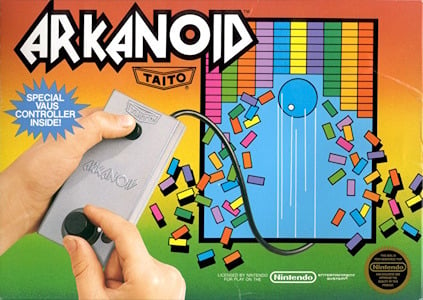
Arkanoid (1986-)
Developer: Taito
Publisher: Taito
Genre: Block Breaker
Composer: Tsukasa Masuko
Arkanoid for the NES was developed by Taito and released in 1987, with Nintendo handling its publishing for the North American and European markets. The game is a home console adaptation of the popular arcade title Arkanoid, which originally debuted in 1986. Over the years, Arkanoid was ported to numerous platforms, including the ZX Spectrum, Commodore 64, Amiga, and later various consoles, solidifying its status as a classic. The NES version retained much of the core gameplay while adapting it for the home system’s capabilities.
The game itself is a modern take on the classic block-breaking genre, inspired by the earlier arcade game Breakout. Players control a paddle called the "Vaus" to bounce a ball against a formation of bricks at the top of the screen, aiming to clear all the blocks without letting the ball fall off the bottom. Arkanoid introduced power-ups and enemies, enhancing the gameplay and adding layers of challenge and strategy. The variety of power-ups, such as lasers, multiple balls, and extended paddles, set it apart from its predecessors and gave players more tools to tackle increasingly complex levels.
The soundtrack for the NES version of Arkanoid featured energetic and catchy melodies that matched the fast-paced gameplay, heightening the sense of urgency as players progressed through the levels. The music was simple but effective, using the NES’s sound capabilities to create memorable tunes that players would often associate with the game’s intensity. The sound effects also contributed significantly to the experience, with satisfying noises for ball hits, power-up collection, and level completion.
Arkanoid did not have a direct prequel, but it was followed by several sequels and spin-offs that expanded on the core formula, such as Arkanoid: Revenge of Doh and Arkanoid Returns. Promotion for the NES release focused on its arcade roots and addictive gameplay, appealing to fans of both casual and more dedicated gaming audiences. The game was generally well-received for its faithful adaptation of the arcade original and its engaging enhancements, securing its place as one of the standout titles in the block-breaking genre on the NES.
Images from MobyGames
Buy Arkanoid
Click one of the Ebay or Amazon buttons below to check the latest prices and purchase Arkanoid for the Nintendo Entertainment System.

Related Searches
Arkanoid is available to purchase and download from a range of vendors. Always shop around...
Various repositories around the internet have scanned and archived a range of retro manuals. Search now to.....
We don't host or link to rom sites for this game. However, there are many sites out there that may be...
Many sites - particularly YouTube - host a range of walkthrough videos to guide you in your quest to get...
There are various sites out there that can offer cheat codes for games. Search now to find all available...
This information can often be obtained through the user manual. Alternatively there are many sites out there...
The initial release date for Arkanoid is stated as December 1986. Other ports of the game may....
There are many sites out there that have collated and documented historic reviews of this game. Search now...
As a Nintendo Entertainment System release, this game was also likely also available on the Famicom. This....
There is now a community of competitive speedrunners who will try and gain the fastest possible time on their....








